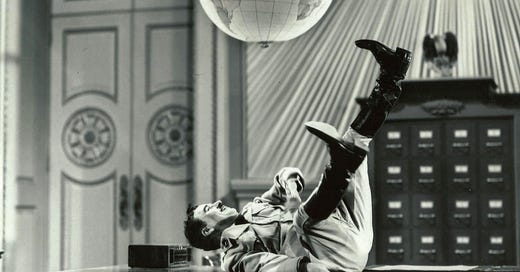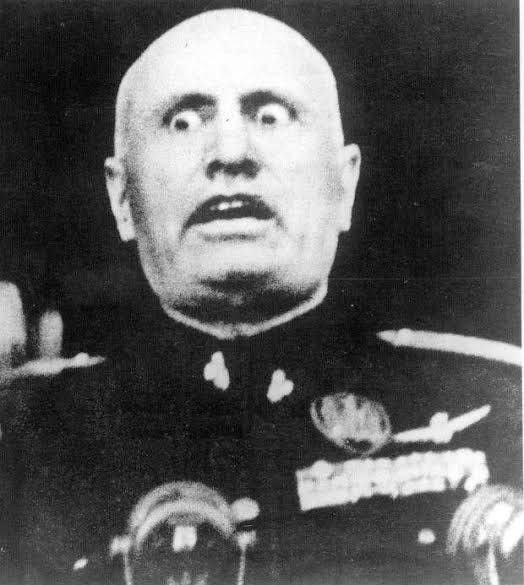No, the Trains Never Ran on Time
Fascism's reputation for evil is well-earned. Its reputation for efficiency isn't.

This piece is by contributor Johan Pregmo.
“Fascism”, as a term, has lost most of its impact. That’s what happens when people use it over and over to describe anyone to the right of Lenin, or any kind of authority they don’t like. But when we examine fascism at its historical source, a clear picture still immediately springs to mind. Evil dictators. Totalitarian regimes. Wars that kill tens of millions. Death camps. Ghoulishly sick human experimentation. An ideological viciousness characterized not just by tyranny, but by irrational, needless suffering. What comes to mind are the most depraved governments known to man, whose crimes and inhumanity are beyond comprehension.
While the Nazi Third Reich and its other fascist companions were every bit as evil as popularly believed, this also leads to a common misunderstanding. Too often, fascism is cast in the role of a powerful supervillain — one most people recognize as morally unconscionable, yet grudgingly respect for its highly efficient, well-organized, top-down ability to move mountains in ways democracies can only dream of. Sure, fascism is bad, but the Wehrmacht was invincible and the trains ran on time. Portrayed as terrifying antagonists in a story where plucky liberal democracies were up against well-oiled machines of ruthless conquest, it’s all too easy to view fascism through this “evil but efficient” lens. The problem is, it has no basis in reality. Fascist regimes have proven themselves time and again to be woefully ineffective, even compared to other forms of autocracy. Fascism was and is an utter circus of bumbling, ideologically possessed clowns whose obsession with loyalty and purity over merit and common sense ran their countries into the ground.
Before we go further, let’s briefly define fascism. Originally coined by Benito Mussolini himself, fascism is a far-right ideology that generally features grassroots populism centered around the authoritarian rule of a single strongman with absolute control over the state. A fascist state, in turn, tolerates no opposition and crushes dissent. What makes fascism distinct from regular autocracy is its jingoist and ultranationalist nature, which often includes ideas about racial superiority. Fascism views the world in terms of nation states and ethnic groups with specific ties to specific lands and quasi-mystical destinies. It harkens back to many ideas of the past, but only superficially — fascism is very much a modern ideology conceived by 20th-century thinkers eager to appropriate the aesthetics of tradition. Most medieval kings were not fascists, nor dictators. Rather, they had loose control over a decentralized feudal system where vassals often dominated the monarch. It was not until the 1600s that the kind of absolutist monarchy we typically associate with the Middle Ages emerged, where kings had complete autocratic power over the state.
However immoral, autocracy can be made to work. History shows many examples of highly effective autocrats who reigned long and governed well. Men like Augustus Caesar, the first Roman emperor, King Louis XIV of France, generally considered to be the model for European royal absolutism, or Napoleon Bonaparte, whose wars and civil reforms set the stage for the world as we know it today.
But these men were not fascists, and would likely scoff at fascism if they saw it, because fascism isn’t even good at autocracy. In fascism, all of the usual problems of autocracy are already present: the tendency toward corruption, the economy of favors, and unchecked nepotism. Then heaped on top are an array of deranged ideological commitments that are out of touch with the real world. The most successful autocrats in history were men with forceful personalities, ambition, and drive, but also the sense to put practicality ahead of ideology. Louis XIV, for example, although a staunch Catholic, had no problem backing the Protestant Swedes in the Thirty Years War against his fellow Catholics in the Holy Roman Empire, because it stymied his biggest geopolitical rival. Despite personally being a pious man, Louis chose the pragmatic path, something fascists are virtually incapable of doing.
The Tin Foil Reich
Adolf Hitler was the very essence of totalitarian tyranny, and yet he was also, in some respects, the equivalent of putting Alex Jones in charge of a country. Hitler was as evil as they came, but he was also a delusional conspiracy theorist living in an entirely different reality from everyone else. During the lead-up to World War II, as Hitler annexed one territory after another, most rational observers saw a traditional geopolitical struggle for power. Hitler instead saw a life-or-death struggle between his Pure Aryans™ and the Jewish conspiracy to bring them down.
Take a moment to consider the sheer insanity of thinking that the entire world, from America to the USSR, is run by a shadowy cabal of incongruously powerful subhumans, and that your survival as a people is dependent on exterminating them. We get so transfixed by the monstrous nature of these beliefs that it’s easy to forget just how crazy they are. Imagine this line of thinking applied to any other group — say, the Irish. Joe Biden is of Irish descent, as are many others in the US government, influential institutions, and large corporations. Imagine running with that and then asserting that the Irish were secretly controlling the entire world and had to be destroyed. Imagine being so serious about it that you waged a world war to carry it out.
So dogmatically demented were the Nazis that even as the Allies were closing in on them, they thought killing more Jews was more important than winning the war — because to them, the two were one and the same. No self-respecting Napoleonic-style autocrat would have committed such a senseless waste of resources for purely ideological reasons. It took conspiratorial, ideological delusion to get there.
As a profoundly anti-intellectual movement that demanded conformity over truth, brain drain was another serious problem for Nazi fascism, as its best and brightest academics — many of them Jewish — fled before the war started. And in the typical style-over-substance approach of fascism, Hitler’s fixation on “wonder weapons” such as prototype fighter planes or the massive Gustav gun rather than logistics betrays an understanding of warfare that was anything but “highly efficient.”
Ideology also hamstrung Nazi imperialism. As they conquered one country after the next, Nazi Germany could have credibly positioned itself as the lesser evil compared to the USSR looming over Eastern Europe — but their racial doctrines demanded they treat their new subjects harshly. Nothing guarantees resistance like an invading army raping, plundering, and brutalizing at will. Again, irrational belief trumping practicality.
And no, the army was not well run either. Its governance was split between the Command of the Wehrmacht (the armed forces broadly) and the Heer (the army in particular). The Heer was, in theory, subordinate to the Wehrmacht High Command. In reality, however, it led to two different sets of senior officers with conflicting priorities and predictably chaotic outcomes.
The (Imperial) Japanese are just like everyone else, only more dysfunctional
This leads us to Germany’s greatest partner in crime, the fascistic Japanese Empire. Having industrialized in the 1800s, Japan entered the 20th century emboldened by victory against Tsarist Russia in the Russo-Japanese War and were determined to be one of the big boys on the world stage — with all the brutality that entailed. Although outwardly modernized, with a National Diet to handle its civil affairs, Japan was driven by a fanatical devotion to the Emperor, whom the masses viewed as a godlike figure. Its politics were dominated by far-right extremism and jingoism, with no room for questions. Indeed, any politician or prominent businessman found “insufficiently patriotic” was liable to get assassinated, with the offender getting a slap on the wrist because his heart was in the right place.
The atrocities Japan committed were spectacular enough on their own, from Mengele-like human experiments to the Nanjing Massacre, but just like Nazi Germany, Imperial Japan was dysfunctional in the extreme — perhaps even more so than their fascist cousins in Europe. The army and the navy, for example, answered only to the Emperor, who, by political tradition, was meant to be a figurehead who only interfered in governance when absolutely necessary. This produced a fundamentally incoherent state of affairs: an autocracy robbed of a forceful executive capable of making decisions quickly. As a result, commands were issued by military authorities, with the army and navy having to compromise with one another as separate entities in need of each other’s support. This was made all the more difficult since the army and navy hated each other. The army wanted to fight Russian communism while the navy was focused on conquest at sea, and the two got along like oil and water.
The civil government, for its part, had no control over the armed forces whatsoever — they could make no treaties or agreements that the military might not later break. If that arrangement sounds like it made the Japanese Empire an unstable actor that adversaries could not rationally deal with, that’s because it did. So, taking stock, Japan had an autocrat who did not rule, a civil government ruling with a culture of murder but with no military power, and a war run by two factions at each other’s throats. But we’re still not done!
When Japan infamously attacked Pearl Harbor and pulled the US into the war, they did so while embroiled in a brutal, unwinnable war of attrition in China, one that cost 2.5 million Japanese casualties (in a nation of 72 million at the time). With limited resources, stuck in a war they could not win, the Japanese decided to pick a fight with an economic superpower. And when the atomic bombs dropped, and defeat became imminent, Emperor Hirohito finally intervened, breaking the stalemate and beginning the process of surrender. In response, ultranationalist elements attempted to stage a coup against the Emperor so they could keep fighting — because they’d rather drive their entire country off a cliff than give up. From its rise as an industrialized fascistic empire to its final spasms, Imperial Japan was the very opposite of a sane, efficient, functional society.
Dropping a Duce
Italy, as the third member of the fascist Axis, was comparatively less insane than its partners, but nevertheless presents a prime case study of fascist buffoonery. Benito Mussolini not only birthed the concept of fascism, he is also associated with its most enduring falsehood. What of those trains he so famously made run on time? The go-to example for fascist orderliness and efficiency? A long debunked myth. Not only did Mussolini take credit for a project that was already underway before he came into office, the trains did not even run on time — most were nowhere near on schedule. It seems a minor issue, but it’s emblematic that fascism’s most famous supposed virtue is built on a lie, like everything else.
Of greater consequence was Italy’s ineptitude as an Axis power. Although it managed to conquer Ethiopia, Italy did so with more difficulty than any modern army should have, being forced to resort to mustard gas after being defeated at Adwa the first time around. Notoriously unreliable and incompetently led, Italy lagged behind the rest of Europe in tactics, having evolved little since the first World War. Their officers were steeped in archaic traditions, their soldiers were poorly trained, their tanks were outdated, and their army was ill-equipped. Mussolini’s failures in Greece made Italy a laughingstock. Despite warnings from his generals, Mussolini invaded, convinced he could defeat the Greeks easily. After only a week, the Italians had been pushed back into Albania, a debacle that enraged Hitler. By far the weakest link of the Axis, they were also the first to fold.
Of course, it’s not as if Mussolini’s civil government was any better. Deeply corrupt, it featured the typical economy of favors where the only way to get anything done was to know a guy who knew a guy and then bribe him. Autocracy always invites a certain degree of corruption, but Italy elevated it to an art form. Mussolini’s government was full of extravagant debauchery, despite the supposedly rugged and virtuous ideal of fascism — bribery and under-the-table deals were commonplace.
This gets to the core flaws of fascism, even setting morality aside — fascists are simply incapable of properly running a country. Fascism is not just a system of hateful, frightening thuggery, it’s also really, really stupid. Fascism represents a boy’s idea of strength, a fundamentally juvenile understanding of governance that fixates on the vibes and aesthetics of power without any grounding in the real world. We so often think of fascists as supervillains but forget that they are also village fools and lunatic crackpots without self-awareness. They deserve not grudging admiration for some phantom efficiency, but mockery for their astronomical and blessedly self-sabotaging incompetence. Never forget that.
See also: “Why I Am Not a Populist”
Subscribe now and never miss a new post. You can also support the work on Patreon. Please consider sharing this article on your social networks, and hit the like button so more people can discover it. You can reach me at @AmericnDreaming on Twitter, or at AmericanDreaming08@Gmail.com.







Fascism is so hard to define because it lacks any coherent ideology because it's a reaction to liberalism/socialism. It's more an aesthetic and an attitude, I think. The one thing that stands out from other strength-worshipping, xenophobic, revanchist ideologies is the emphasis on action. Theorizing, debating, abstracting - all for weaklings; a STRONG man takes ACTION. Which is a tempting prospect; even liberals admired Mussolini as a guy who Got Things Done. Fascism replaces the confusion of nuance with the certainty of decision. And, in the short term, that can work. While the liberals are holding meetings and blathering about "rights," the fascists know that the only truth is power, and make their own reality (or try). And in a tactical fight, the group that follows one leader has an advantage over the group that insists on democracy. But since fascism is nothing but a parasitic pseudo-ideology leeching off of liberalism, then it inevitably fails. But never dies; future shock, competition for resources, and the failure of capitalism to deliver on its advertising will always offer opportunities for fascism to come back.